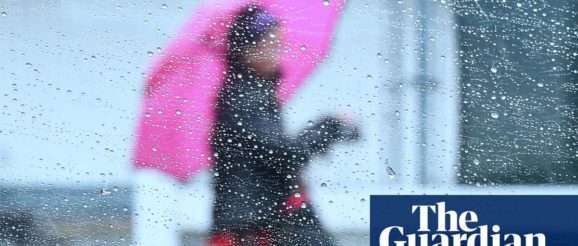Can’t stand the rain? How wet weather affects human behaviour | Science | The Guardian

It’s raining, it’s pouring, the old man is snoring. He bumped his head when he went to bed, and he couldn’t get up in the morning. This was possibly because in the absence of sunlight his body was still producing the hormone melatonin, which makes you sleepy. There are many ways that rainfall affects human behaviour. Why do crime levels drop when the heavens open? How much does rain really affect people’s moods and behaviour?
In 2008 university researchers published a paper proposing that weak summer monsoons were influential in the downfall of three dynasties in ancient China. By analysing stalagmites from a cave, they were able to match periods of significantly decreased rainfall with periods of social upheaval and the demise of the Tang, Yuan and Ming dynasties. This is thought to be related to reduced rice cultivation.
But how might rain affect social behaviour in the modern world? A 2009 New York Times investigation found that homicide rates in New York drop significantly on rainy days. Meanwhile, in Britain, Dr Peter Langmead-Jones of Greater Manchester police published a study in 2015 detailing an analysis of 6.6m police records over one decade in Manchester. He found that crime rises as temperature increases up to 18C, then starts to tail off again as the mercury rises further.
But does rainfall influence the prevalence of certain types of crime? Langmead-Jones believes so.
“The research showed that the heavier the rainfall, the lower the recorded crime,” he said. “This confirms a cornerstone of police craft that heavy rain reduces or suppresses crime. This is commonly referred to as PC Rain. There is a strong association between heavy rain and violence including domestic abuse, but we know that domestic abuse is frequently fuelled by alcohol. It may be that heavy rain deters people from going out to buy alcohol and to consume alcohol and the reduced alcohol consumption results in fewer crimes.”
Psychologist Dr Keri Nixon, who has experience dealing with violent criminals, says people “tend to not want to go out and commit crime in bad weather unless [they’re] desperate. Also for opportunistic crimes against individuals there are fewer people out.”
It’s not all good news though. One study in 1997 concluded that the behaviour of children can predict oncoming storms – they were observed to exhibit their worst behaviour when barometric pressure fell. One theory as to why this happens is that positive ions in the atmosphere increase blood pressure and irritability. Another study in 2012 found that women are disproportionately adversely affected psychologically by rain and that they report much lower levels of life satisfaction than men on rainy days. Furthermore, heavy rainfall can also make you hungry; when the sky is overcast or sunlight is blocked, the hormone serotonin decreases, which in turn can increase carbohydrate cravings and make you hungry.
For all the complaints about rain, it does have some characteristics that hold broad appeal. The sound of raindrops can be very comforting and often features on sleep-inducing relaxation CDs. The theory behind this is that the pitter-patter of raindrops is a form of “pink noise”, which decreases brain activity and consequently improves the quality of sleep. So if it’s raining where you are, the best thing to do may be to curl up and have a nap.
